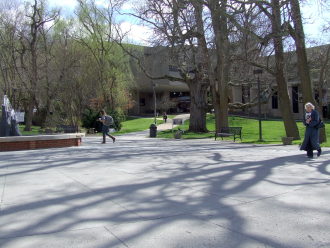In the popular imagination, the Appalachian Mountains have long been seen as a bastion of individualism and isolation. Tune in to any popular television show, or pick up a novel set in the region, and you’ll most likely encounter that image. Even longtime residents seldom seem to know much about the region’s far-flung communities.
That sense of disconnectedness is part of these mountains’ romance, but it doesn’t tell the whole story and often ignores the similarities, shared heritage and goals of those inhabiting the peaks and valleys collectively known as Appalachia.
In an ongoing effort to connect those dispersed communities, the Appalachian Studies Association held its 38th annual conference last month in Johnson City, Tenn. The one-of-a-kind event unites scholars and musicians, activists and academics, to celebrate the often misunderstood region’s distinctive heritage, culture and physical landscape.
Jeff Keith, a Warren Wilson College global studies professor who was a presenter at this year’s gathering, says, “It is unique from other academic conferences I attend, because it provides an opportunity for many different types of people to engage with regional issues. Every year,” he notes, “I manage to meet a person who has inspired me through their work and efforts. In this way, the ASA Conference allows me to develop a sense of community that strengthens my connection to this region and my commitment to it.”
Coming together
Officially launched in 1978 at Berea College in Kentucky, the annual get-together grew out of a shared desire to unite “the activism, discussion and organizing of various groups centered on the study of Appalachian life, culture and scholarship,” according to the association’s website.
This year’s conference was held March 27-29 on the campus of East Tennessee State University. To better reflect the region’s vast scope, which extends from the Northeast to the Deep South, a different school hosts the event each year.

This year’s theme, “Many Mountains, Many Musics,” encouraged attendees “to view Appalachia from a fresh perspective and discover its emergence as a creative, dynamic force,” according to an ASA press release. Keynote speaker Margo Miller, executive director of the Knoxville-based Appalachian Community Fund, spoke about her organization’s role in building community in central Appalachia and shared some success stories. Other highlights included a musical performance by Ricky Skaggs and Kentucky Thunder, a special pre-conference hike around the Roan Highlands, and a tour of the Birthplace of Country Music Museum in nearby Bristol, Tenn.
For Hannah Furgiuele, program coordinator for Mars Hill University’s Liston B. Ramsey Center for Regional Studies, it’s a chance to discover common themes that transcend state lines and traditional barriers. “The conference has provided me with a community up and down the mountain ranges, Georgia to Canada, who share a love for the ridgelines and peaks, rivers and streams, and communities and people who reside there,” she says.
Unity in diversity
This year’s sessions covered topics ranging from the little-known cultural impact of “Affrilachian” and Native American communities to the far-reaching influence of traditional Appalachian music and literature to the environmental impact of mountain industries such as coal mining and fracking. Another key focus was community efforts to revitalize and diversify local economies while preserving a sense of traditional pride and values.
It all wove together seamlessly: En route from one presentation to another, attendees might stumble on an impromptu jam session of old-time folk ballads, followed by a presentation on those same tunes’ journey from the highlands of Scotland and Wales to the remote hollers where they live on today.
Other presenters addressed what it means to be “Appalachian,” seeking to dispel negative stereotypes and shed light on oft-forgotten aspects of the region’s heritage. In a post-conference interview, Keith, who took part in a roundtable discussion on multiculturalism in Western North Carolina, emphasized “the need for a greater acknowledgement of Appalachian diversity. Too often, Appalachian history is perceived as a history of white mountaineers, and that is a destructively false understanding of the region and the many people who have shaped it.”
Chris Brown, executive director of the Community Housing Coalition of Madison County, sees the conference as a chance to share the successes and challenges of mountain activism and brainstorm with folks who may be facing similar issues in their own communities. “Observing the cultural evolution that has happened in Appalachia is extremely useful in understanding the evolutionary process of human culture as a whole,” he notes. “It’s extremely important that organizations such as the Appalachian Studies Association exist to keep that conversation alive amid a diverse group.”
Brown and other coalition members presented their work on the rejuvenation and strategic development of rural communities. “For me, the bottom-line goal is building bridges,” he said later. “The success of our communities depends on … first seeking where we can bridge, and focusing less on the divisions between us.”

Portrait of a culture
Appalachian State University students sparked a lively discussion in a session titled “The Elk Knob Art & Planning Project” that focused on efforts to bolster art projects in four communities in Ashe and Watauga counties.
Les Reker, director of the Rural Heritage Museum in Mars Hill, says the conference “brings an awareness of the complexity of the Appalachian culture and environment.” In his panel presentation on the Anderson Rosenwald School, which served African-Americans in Madison County, graduates shared firsthand accounts of their experiences during segregation and the civil rights movement of the 1950s and ’60s.
That awareness, says Warren Wilson College archaeology professor David Moore, is particularly useful in the academic world. “For people who research in a professional setting, it’s important to know what others are doing in related fields. The opportunity to meet and mingle and to share research and insights on the whole span of Appalachian culture is invaluable.”
But for first-time presenter Jeannie Dunn, who owns Red Moon Herbs in Asheville, the focus was on more immediately tangible results. Dunn said she was excited about “finding new organic farmers and conscientious wild harvesters of prolific plants” and expanding her network of harvesters. She also relished the chance to spread creative, progressive ideas. “If I can plant a seed in one person’s head on a new way to use their land that creates revenue and keeps the land in agricultural or medicinal herb use instead of development, I’ve done what I came to do.”
To learn more about the Appalachian Studies Association, the annual conference or the Journal of Appalachian Studies, visit appalachianstudies.org.




Before you comment
The comments section is here to provide a platform for civil dialogue on the issues we face together as a local community. Xpress is committed to offering this platform for all voices, but when the tone of the discussion gets nasty or strays off topic, we believe many people choose not to participate. Xpress editors are determined to moderate comments to ensure a constructive interchange is maintained. All comments judged not to be in keeping with the spirit of civil discourse will be removed and repeat violators will be banned. See here for our terms of service. Thank you for being part of this effort to promote respectful discussion.